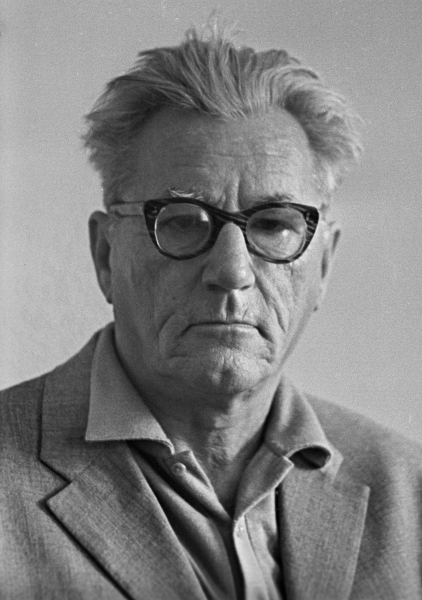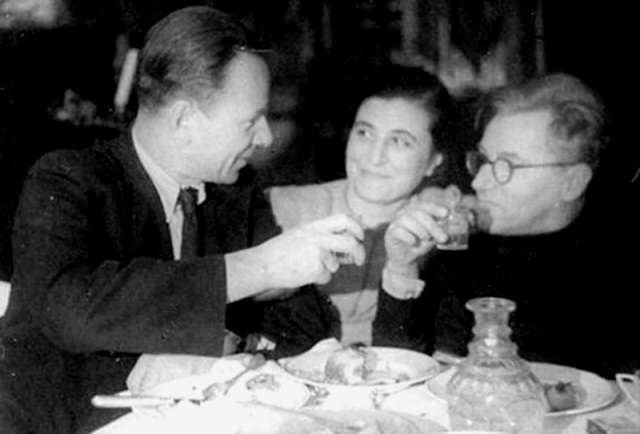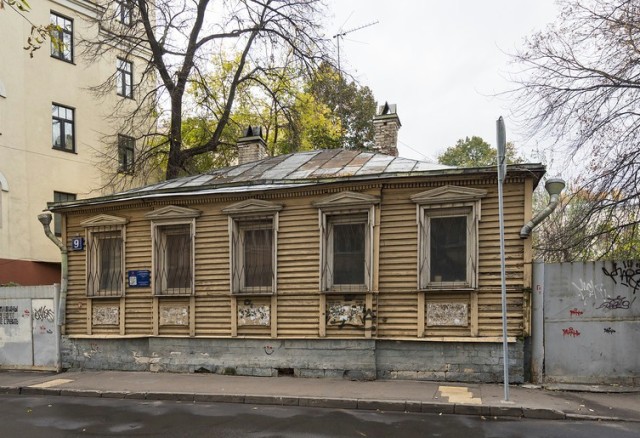Алоизий Могарыч
Русский > Персонажи > Московские персонажи > Алоизий Могарыч
Мы продолжаем напряженно работать, чтобы улучшить наш сайт и перевести его на другие языки. Русская версия этой страницы еще не совсем готова. Поэтому мы представляем здесь пока английскую версию. Мы благодарим вас за понимание.
Description
In chapter 24 of The Master and Margarita, when Margarita asked Woland to bring her and the master back to the basement near the Arbat, the master said: «Ah, don't listen to the poor woman, Messire! Someone else has long been living in the basement». Though Woland said: «But we shall try». And he called out: «Azazello!» At once there dropped from the ceiling on to the floor a bewildered and nearly delirious citizen in nothing but his underwear, with a suitcase in his hand for some reason and wearing a cap.
With this description, Mikhail Bulgakov referred to the fact that under the Stalin terror every soviet citizen had always a suitcase ready with the most necessary things, just in case of un unexpected visit from the secret police at night.
The bewildered and nearly delirious citizen in «nothing but his underwear» was Aloisy Mogarych, who had reported the master to the secret police NKVD for the possession of illegal literature. He hoped to move in into the master's basement after his arrest. And it worked.
«Know a witch when you see one!», Margarita howled when she heard it, and she sank her nails into Aloisy Mogarych's face.
Background
The first name Aloisy sounds quite odd in Russian ears. Especially in the rather absurd combination of the Latin Aloisius with the Russian slang word могарыч [mogarich].
The Russian word магарыч [magarich] or могарыч [mogarich] is derived from the Arab word مخارج [maḫāriǧ] which means cost or expense, but also refreshment - usually wine. Originally, it was used to refer to the drink which was offered when the sale of a horse was closed. Later, It got a bad undertone because it suggested not only exaggerated drinking, but also sometimes bribes.
Loose end
When you read The Master and Margarita in Dutch, in French or in English, you only read about Mogarych in the above mentioned excerpt of chapter 24. In most Russian versions, however, the master already talks about him as «his new friend» when he talks to Ivan Bezdomny in doctor Stravinsky's hospital in chapter 13, as you can read following the link hereunder. The text in blue is not in the translations.
Click here to read the loose end
In his TV-serial Мастер и Маргарита [Master i Margarita] from 2005, director Vladimir Bortko showed the meeting between the master and Mogarych, as you can see when you click the following link.
Click here to see the meeting of the Master and Mogarych
Prototype
Mogarych's character is inspired on the playwright Sergey Aleksandrovich Yermolinsky (1900-1984), who got acquainted, in 1929, with Maria Artemyevna Chimishkyan (1904-?), a friend of Bulgakov and his second wife Lyubov Yevgenyeva Belozerskaya (1894-1987). Bulgakov became acquainted with Yermolinsky in the period when the media campaign against him reached its climax, reminiscent of the master's situation when he met Mogarych.
After some time, Sergey and Maria got married and they moved to the little house of Sergey Sergeevich Topleninov in Mansurovsky pereulok 9. This wooden little house would give the inspiration for the basement where the master lived with Margarita in the novel, and where Mogarych moved in as soon as the master was admitted to the psychiatric hospital.
So Yermolinsky became «a new friend» of the Bulgakovs by his marriage with Maria Arternyevna, but Lyubov Belozerskaya wrote in her memoires that se didn't trust him. She called him «a two-faced man, who forgets what is convenient to him to forget». In her book My Life with Mikhail Bulgakov, published by Ardis Publishers in 1986, she wrote: «I will move to some of the most unpleasant pages of my memoires. To Sergey Yermolinsky». When she referred to the article About Mikhail Bulgakov which Yermolinsky had published in the journal Theater in April 1966, and in which he presented himself as a friend of Bulgakov, she commented: «Yermolinsky would fare badly with the lie detector», «Bulgakov never felt any particular liking for Yermolinsky» and «there is nothing here but deceit». It is possible that Bulgakov referred to the opinion of Lyubov Belozerskaya when, in the aforementioned loose end of the novel, he made Margarita say: «Do what you want, but I tell you that this person makes a repulsive impression on me».
Elena Sergeevna, Bulgakov's third wife, was somewhat more reserved than Belozerskaya in her statements on Yermolinsky, although she also regularly had doubts. On December 5, 1938, for example, she noted in her diary that Yermolinsky, like Mogarych, was remarkably well informed about «all kinds of talk, rumors, gossip and news». On March 5, 1940, she had a conversation with Bulgakov about Yermolinsky, and about whether he could be a traitor. Bulgakov finally concluded: «Нет, не предал!» Or «No, he did not betray me». The passage about the new friend from chapter 13 was crossed out in red that day, but Woland's punishment of Mogarych in chapter 24 was not deleted. Anyway, five days later, the author passed away, and we will never know if he had planned on making further changes to the Mogarych character.
In real life Bulgakov was, like the master, often bothered by «intruders». In the '30's the Bulgakovs were frequently visited by snoopers and informants, like the journalist and squealer Leonid Isaakovich Kantorovich (1911-?), the writer and translator Emmanuel Lvovich Zhukhovitsky (1881-1937) and MKhAT actor and director Grigory Grigoryevich (Grisha) Konsky (1911-1972).
Bulgakov had no choice but to tolerate them, although they stubbornly insisted to constantly redirect the discussions towards political questions. This situation caused tensions, and Bulgakov's consolation probably was the joy he found in offensing them every now and then.
The fate of Mogarych
Mogarych is only lightly punished by Woland. In the epilogue of the novel it turns out that he even becomes an important official: he succeeds Grigory Rimsky as the findirector of the Variety Theatre.
Поместить эту страницу |
Московские персонажи
- Аннушка
- Арчибальд Арчибальдович
- Жорж Бенгальский
- Михаил Александрович Берлиоз
- Иван Николаевич Бездомный
- Никанор Иванович Босой
- Автор скетчей Хустов
- Латунский, Ариман и Лаврович
- Степан Богданович Лиходеев
- Савва Потапович Куролесов
- Профессор Кузьмин
- Барон Майгель
- Алоизий Могарыч
- Максимилиан Андреевич Поплавский
- Александр Рюхин
- Аркадий Аполлонович Семплеяров
- Андрей Фокич Соков
- Доктор Стравинский
- Тузбубен
- Писателей в Грибоедове
- Другие персонажи в Москве
Иллюстрации
Ваш гид по роману

In this section are explained, per chapter, all typical notions, names of people and places, quotations and expressions from the novel with a description of the political, social, economical and cultural context.


